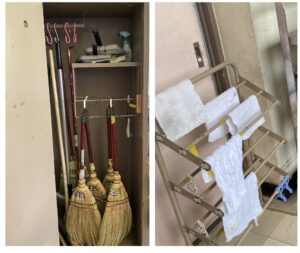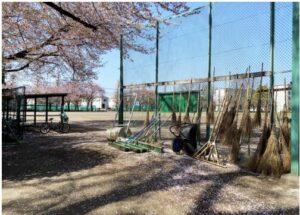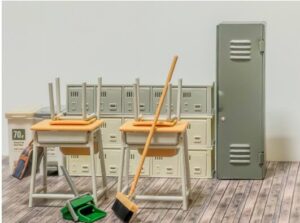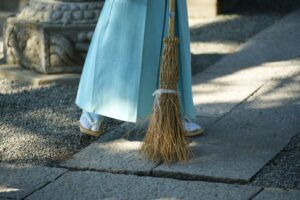Most Japanese schools allocate time for students to clean school buildings, including classrooms, stairs, and even toilets. However, this practice is very unfamiliar in many countries where schools typically hire employees for cleaning duties. So, why do students clean in Japanese schools? This article explores the concept of “cleaning time” in Japanese schools, its significance, and the adoption of similar practices in other countries.
What is cleaning time in Japan?

Japanese schools normally have cleaning time every day as a part of their daily school schedule. It starts from the first grade of elementary school and continues till high school. Normally, this cleaning time is scheduled after lunchtime or after all periods are over and takes 5 to 15 minutes.
Generally, teachers make groups of 4 to 6 students and assign roles or areas to clean during cleaning time. Each group rotates cleaning areas every week.
These areas include classrooms that use daily staircases and even toilets. Within a classroom, there are numerous areas to clean, including floors, desks, windows, and blackboards. For example, when students clean the floors, they move desks and chairs to the back or front of the classroom to create space. They are often instructed to sweep before using wet towels to wipe surfaces, ensuring a thorough cleaning. Once the sweeping is completed, the group assigned to wiping uses wet towels to clean the surfaces.
Each classroom has a storage area for cleaning supplies and is kept tidy and organized by students.

Cleaning is also done after club activities. In both sports clubs and non-sports clubs, students clean areas and goods they have used during practices. In order to do it, there are many types of brushes in the fields and it is very common that captains or teachers check whether they have cleaned or not. Students can leave school after cleaning is completed.

What is the purpose of cleaning time?

There are some reasons why cleaning time is a part of school education in Japan.
First, cleaning is important to develop good manners and courtesy. Cleaning up after yourself is considered to be a part of manners and consideration for others. For example, if someone leaves trash on the seat you used in the library or on the bullet train, others will feel uncomfortable.
Second, cleaning fosters children’s social skills. Cleaning time is not just about cleaning places, but it is also about cleaning children’s minds. Cleaning has significance in moral education, and cleaning refreshes the mind and fosters an altruistic spirit. Cleaning time is also important in terms of dividing roles and fulfilling their roles responsibly.
Cleaning time teaches not only the importance of cleanliness but also a sense of responsibility and cooperation. Cleaning also contributes to the development of self-discipline, good manners, and even mindfulness.
How did the cleaning time in Japanese schools start?

According to one theory, the impetus for the establishment of cleaning time in Japanese schools has to do with Buddhist and Shinto practices. In Zen Buddhism, cleaning is actually positioned as part of the practice. In other words, character building through cleaning has taken root in Japan since ancient times. Even before the establishment of “schools” in Japan, the custom of cleaning was practiced and this custom gradually became integrated into the school system and continues to this day. Cleaning has proved to be beneficial even in the past, such as nurturing children’s social skills and reducing labor costs for cleaning staff.
Does the cleaning culture only exist in schools?
Cleaning is not something that only takes place in schools. Japanese people have a sense of responsibility to clean the places they use by themselves. Even in hotels, during school trips, it is normal for students to make their own beds and tidy up their rooms in the morning.
During the soccer and rugby world cups, Japanese supporters voluntarily cleaned the stadium after the match, and players tidied up their waiting rooms before leaving. Such cleaning habits impressed the world. The Japanese mindset of cleaning up after themselves as a matter of course has been praised around the world on numerous occasions, and more and more countries are imitating it.
These cleaning habits are learned from childhood by watching their parents and nurtured by cleaning classrooms at school. Therefore, Japanese people do not feel uncomfortable with the sight of others picking up trash and can participate in the process themselves. This reflects the beauty of the Japanese mentality.
Is Cleaning Abusive?

The cleaning time in Japanese schools is sometimes criticized from the point of child labor and child abuse. For example, in the U.S. and some parts of Europe, it is considered that cleaning classrooms is the job of cleaners, and students are basically not supposed to clean since school is a place to study.
However, in Japan, cleaning time is positioned as an educational activity and is intended to educate children and develop their social skills as mentioned above. During this time, emphasis is placed on children’s cooperation and sense of responsibility. Japanese parents also recognize this importance.
Japanese “Cleaning Time” Introduced to Schools Overseas

Although “cleaning time” is set aside in many Japanese schools, there are actually few countries where students clean their schools. However, in recent years, more and more schools overseas have introduced cleaning time after seeing these Japanese efforts. It has been introduced in an increasing number of cases, and gives positive effects to students.
In this section, we will see two examples that introduced cleaning time from Japan.
Singapore
BBC NEWS reported that in Singapore, cleaning time has been introduced in reference to schools in Japan and Taiwan, and efforts are being made to foster a sense of responsibility and the ability to take good care of belongings by themselves. Not only the Singapore government but also students’ parents are satisfied with cleaning time because they believe that children will be able to develop better habits when they are young.
England (a school in Devon)
According to BBC News, a school in England has implemented cleaning time. Teachers decided to implement cleaning duty because they wanted students to respect their environment in the school, and they thought that cleaning by themselves was a great way to teach it. The effects were seen in students’ behaviors toward cleaning. Some students have mentioned that cleaning is “protecting school” and it is good because they can learn how to use cleaning tools. The school president also said that this cleaning by students has helped the school to save money since they do not have to hire workers.
Summary
Cleaning time in Japanese schools is important in terms of the development of children’s education and social skills. In recent years, more and more schools overseas are introducing cleaning time, as Japanese approaches are attracting attention. Cleaning time is positioned as an educational activity and helps to improve children’s sense of responsibility, cooperation, and manners.
For those who want to know more about Japanese education
Shin Edupower provides programs that enable online exchange and collaboration between schools in India and Japan, as well as study tours to Japan for educators and students. If you would like to visit a Japanese school and see for yourself what cleaning time is like, Shin Edupower’s study tour and educator visit are the perfect option. If you are interested, please feel free to contact us here.



